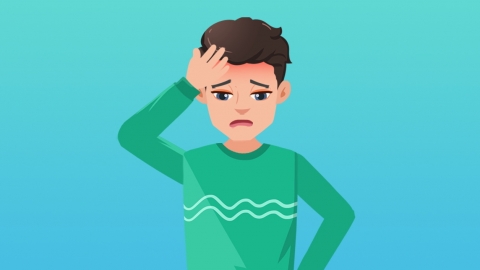Why does otolith disease cause headaches?
Generally, headaches caused by otolith disorders may be triggered by a chain reaction due to vestibular dysfunction, abnormal head posture with tension, autonomic nervous system dysfunction, concurrent vestibular neuritis, cerebral vasospasm, and other related factors. It is recommended to seek timely medical consultation to identify the underlying cause and receive appropriate treatment under a physician's guidance. Detailed analysis is as follows:

1. Chain reaction due to vestibular dysfunction: Otolith detachment leads to vestibular dysfunction, causing disordered balance signals that stimulate the central nervous system, resulting in referred headaches, often bilateral temporal distension pain. Timely otolith repositioning treatment is necessary, followed by bed rest and avoidance of strenuous activity after repositioning.
2. Tension from abnormal head posture: During vertigo attacks, patients are forced to maintain specific postures, causing continuous tension in neck muscles that pull on the head, leading to tension-type headaches accompanied by neck stiffness. Adjustment of head posture is recommended, avoiding prolonged head-down positions or lateral bending. Applying a warm towel compress to the neck area and gentle massage can help relax the muscles.
3. Autonomic nervous system dysfunction: Vestibular dysfunction affects the autonomic nervous system, causing disordered vasoconstriction and vasodilation, leading to vascular headaches, accompanied by nausea and sweating. Patients should remain in a quiet environment, avoid auditory and light stimulation, and follow medical advice to take medications such as flunarizine hydrochloride capsules, nimodipine tablets, and vitamin B1 tablets to regulate nerve function.
4. Concurrent vestibular neuritis: Viral infection-induced vestibular neuritis simultaneously affects the vestibular nerve and head nerves, causing coexistence of otolith disorders and headaches, accompanied by fever and tinnitus. Patients may follow medical advice to use prednisone tablets, acyclovir tablets, mecobalamin tablets, and other medications for anti-inflammatory, antiviral, and nerve-nourishing effects to alleviate symptoms.
5. Cerebral vasospasm: Recurrent vertigo causes persistent cerebral vasoconstriction and spasms, leading to insufficient cerebral blood supply and headaches, accompanied by dizziness and blurred vision. Immediate bed rest is required, along with medications prescribed by a physician, such as nimodipine for injection, fasudil hydrochloride injection, and ginkgo biloba extract injection, to relieve spasms and improve cerebral blood supply. In severe cases, cerebral vasodilation procedures may be necessary to relieve vascular spasms and restore blood flow.
In daily life, sudden head movements such as rapid turning or lowering the head should be avoided to reduce the risk of otolith episodes. Maintain a regular routine, ensure sufficient sleep, and avoid excessive fatigue. Engage in appropriate balance training exercises, such as walking in a straight line or standing on one leg, to enhance vestibular stability and reduce headache occurrence.





